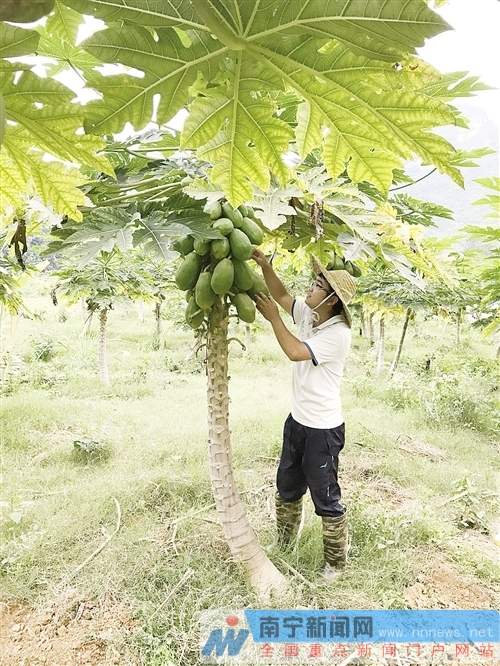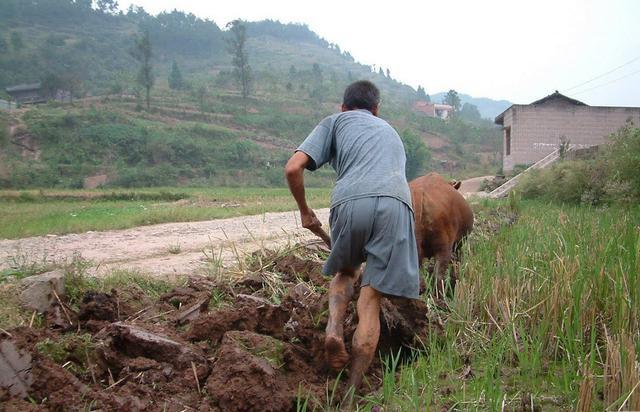The "post-90s" college students return to their hometown to plant papaya and take the villagers on the road to becoming rich.

Wei Xin, a post-90s college student, takes care of papaya in the papaya garden.
In the fields of Shanggantun, Xinghua Village, Baishan Town, Mashan County, a young man is often seen sweating in the papaya garden. He is the "post-90s" college student Wei. In 2014, Wei graduated from the Agricultural College of Guangxi University. As a college student walking out of the mountains, he is the pride of the village. But Wei Qing made an eye-popping decision in the village: to return home to plant fruit papaya! As a result, Wei Qing is called "Handa" by the people in his hometown. However, in the eyes of this villager, "simple and big" sold more than 370000 jin of papaya in more than two months, and the products were exported to Beijing, Shanghai, Chengdu, Chongqing and other cities, becoming local celebrities. He also led the villagers to plant papayas to help them get rid of poverty and become rich.
College students return to their hometown to grow papaya and get a cold shoulder.
Wei Qing, who graduated from Agricultural Resources and Environment of Agricultural College of Guangxi University in 2014, is one of the few key university graduates in Xinghua Village, Baishan Town, and is the pride of the village. In people's eyes, he should become a civil servant or a white-collar worker of the company and lead a "good life" in the city, but after market research in 2015, he made a bold decision to go home with his classmates and friends to grow fruit-papaya.
His decision "blew up the pot" at home. All relatives, including their parents, are against it. They think that being a farmer is something that uneducated people would do. Having studied so hard, they should not go back to the mountains to continue the fate of generations facing the loess. The villagers even laughed at him as a "simple and big" and made a mockery of him. But Wei ignored it and devoted himself to planting.
Without funds, he borrowed 10, 000 or 20, 000 yuan from friends. His parents could not overcome his stubbornness, and they also helped him solve some of the funds. He and his classmate and friend Xiao Ouxuechang raised 420000 yuan one after another to start their business.
The supply of products exceeds the demand to allay the doubts of the villagers.
In January 2015, Wei Qing and his classmates and friends naturally transferred 155 mu of land from Shanggan and Xiagan and began to grow Risheng white-skinned fruit papaya. The villagers are not optimistic about them, and many people are waiting to see the jokes of the two college students.
"in terms of planting technology, I have a little theoretical basis. In market research, I think the prospect of growing papaya is better than that of other fruits, and its cycle is short. The product can be produced in more than 200 days, and the cash flow is fast." Wei Qing said.
At the beginning, Wei Qing did the integrated planting of water, fertilizer and medicine in the land, and spent more than 100,000 yuan to build drip irrigation facilities. This decision brought benefits to two entrepreneurial college students. From June to mid-July 2016, Mashan suffered high temperatures for more than 40 days and did not rain. Drip irrigation facilities, which are regarded by the villagers as "losers", ensure the watering of the land, thus ensuring the healthy growth of papaya.
October 9, 2016 is an unforgettable day for Wei. On this day, his orchard bore fruit. The first car of papaya sold 8325 jin, 1.30 yuan per jin. Shanggantun suddenly became lively. In villages with few vehicles, big trucks went in and out almost every day. Wei Qing sold 43 cars with a total of more than 370000 jin of papaya in more than two months.
Seeing that there is money to be made, the farmers around them also have the idea of planting. In order to facilitate communication with growers, on November 3, 2016, Wei Qing initiated the establishment of a professional cooperative for Runtian planting in Mashan County. At present, nine farmers have participated, and four of them are local poor families. more than 10 left-behind women and elderly people in the village have jobs, and eight poor households have an income of nearly 6000 yuan a year.
Dream of becoming a "papaya king" to make the villagers rich
In 2017, Wei's orchard entered a high-yielding period. Between March 13 and May 9 alone, Wei Qing's papaya sold 470000 yuan, and the products were exported to Beijing, Shanghai, Chengdu, Chongqing and other cities, recovered all the investment, and really began to make money.
The villagers waiting to see the joke were thoroughly subdued by the two "college student farmers". Seeing that there is such a good prospect of growing fruit papaya, the surrounding farmers also have the idea to join. Villager Wei Yongxiao said that under the leadership of Wei Qing, he tried to grow five mu of land, and last year he got more than 10,000 yuan. After deducting the cost, he made a net profit of more than 6000 yuan. He plans to lease another 30 to 50 mu of land to expand the industry. Qin Ruixiang, a poor family in Shanggantun, says that since Weiqing contracted the land, he has hired himself to help plant papaya and harvest papaya in the field, where six or seven people are working every day. Meng Qiuzhen, a villager from Shanggantun, said that she works in the orchard, works near home, works more than 20 days a month, earns 100 yuan a day, earns more than 2000 yuan a month, does not have to go out, can make money at home, and can take care of his family. Meng Qiuzhen is very satisfied with her present job.
Wei Qing said that their cooperative will achieve 500 mu of papaya planting industry within three years, and drive farmers to plant 200 mu, forming a characteristic industry in Xinghua Village. It is understood that there are 37 major customers cooperating with Wei Qing, and each customer's demand for papaya is more than 1 million jin a year.
"there is a banana king in Guangxi, and there is no papaya king yet. I want to be this king." Wei hopes that one day, like Lu Yizhen, the "banana king" of Longan County, he will benefit the township through his own industry, drive more villagers to become rich, and let them embark on the road of getting rid of poverty and becoming well-off.
- Prev

Zeng Zhenhua: zero experience breeding sika deer out of the road to prosperity
Zeng Zhenhua: zero experience breeding sika deer out of the road to prosperity
- Next

The doctor gave up his annual salary of one million and went back to farming to drive the whole village to get rich and be praised.
The doctor gave up his annual salary of one million and went back to farming to drive the whole village to get rich and be praised.
Related
- A course of planting techniques and methods on how to grow carrots
- How to plant the latest tulips?
- Is it better to pick tea in the morning or in the afternoon? When is the best time for tea to be picked? what is the third or fifth tea?
- Launch Yuanxiao Happy combination Haocha + Tea Yuan healthy Taste
- Penghu Tourism "Fireworks 20 Parade with You"
- 2022 West Lake Happiness holds "Digital Revitalization Voucher" and draws iphone13 and laptop.
- Banqiao Fuzhou social houses are designed to change start-up combined with police elimination to create a safe and livable environment
- The convenient measure of "mechanical weeding" in Xinbei has been abused and the Agriculture Bureau has imposed heavy penalties on the illegal land consolidation.
- Changgeng University Joins Hands with Four Memory Factories to Rescue Memory Talent Shortage
- The list of Taiwan's top 100 MVP managers is listed by the Director-General of the Farmers' Association of Sanxia District.

